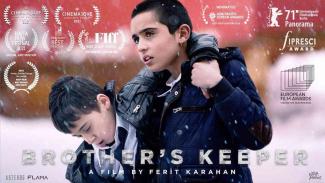Since the birth of modern education, State has always tried to influence the field of pedagogy. The School serves as a place where State first tries to turn citizens into obedient subjects. The Turkish film, Brother’s Keeper - showcased at Habitat International Film Festival 2022, Delhi- provides the microscopic vision of this process.
The film, set in a boarding school for Kurdish boys in Eastern Anatolia, follows the journey of Yusuf, an 11 year old boy, trying to care for his friend, Mehmat. The story begins with the teacher punishing three boys (including Mehmat) by making them bathe in cold water in the chilling night weather of -35 degrees. He directs a boy to pour water on another boy and vice versa. A bath prefect is called upon to keep a watch on these punished kids. There is a prefect for all things including a sickroom prefect. The next morning, Mehmat falls ill and become unconscious. Yusuf is directed to take Mehmat to sickroom, a room with only medicines, managed by another school student. In the assembly, the principal berates students for not following the rules in spite of state providing free food and water to bath once a week. It is followed by a student being publicly punished by shaving bald patch from the middle of his head for running away to the city. All deviation from the rule is met with punishment. In another scene a boy during the lunch room tries to smuggle extra bread, when caught and asked by the teacher, Salem, ‘Why?’ He replies that a single slice doesn’t fill his belly. His honesty is rewarded by starving him.
When authorities finally realize the gravity of the situation, it is decided to take Mehmat to hospital. However, there’s no ambulance available, the roads are blocked, and the other option of using sledging with the help of locals – but the authorities are too arrogant to ask for any help. At this moment, the real series of events leading to Mehmat’s unconsciousness unfolds. Teachers, overworked and underpaid, play a blame game. All of them are negligent of their duties. All of them are guilty (including Yusuf). The movie ends with a bare-headed Yusuf taking a bath. It has a chilling effect (no pun intended). None of the others are held accountable. In this film directed and written by Ferit Karahan, the characters in the film use humour to survive in the ruthless environment. Is this School? Or a reflection of the state? Or is it the state itself?
There are many ways to read this film. One aspect is the torment that Kurdish child has to suffer in state-run Turkish schools. Another is what happens when the schools are turned into an authoritarian warehouse. And a third is the response of those in power during a crisis.
In Turkey, the use of Kurdish language is restricted. The Residential Schools are designed to convert Kurd children into obedient Turks. In India, a similar model only for tribal communities is followed by the Eklavya Model Residential Schools funded under the central Ministry of Tribal Affairs, and monitored by the respective state government. Eklavya, the name taken from a character of Mahabharata is a tell-all, and betrays the constitutional values of pluralism and diversity inscribed in the Constitution. There are reports of flagrant sexual abuse, low quality of living condition, and substandard quality of education being given to the pupils in these schools. In Odisha, as per the response to a RTI report filed by the Economics Times in 2015, there were 155 deaths and 16 cases of sexual abuse reported in these residential schools, excluding the data from some districts which were yet to respond. This parallel between the Kurdish children experience and Tribal children experience is not only relatable, but raises deep concerns on the functioning of State in the domain of pedagogy.
In one scene, Yusuf out of helplessness and desperation smuggles a phone to call his mother. His mother refuses to understand the situation or emotional condition of Yusuf and admonishes him, “What does Mehmat’s health has to do with you? You focus on studies”. This inability of Yusuf’s mother to empathies with him translates into the sheer loneliness and alienation faced by Kurd children in Turkey’s schools. In August 2017, Haider Ali Khan, a 9 year old boy, went viral on social media for hosting a national flag in chest-deep water in a school in Dhubri, Assam - a flood prone area. He was celebrated. No questions were raised on the health risks or other risks run by the child. Later, this boy was left out of the final draft of the NRC. The news reports of floods in Assam have again begun. Who would this boy call for help? How will the State react? Will there be empathy and care for him or just admonishment to follow duties?











